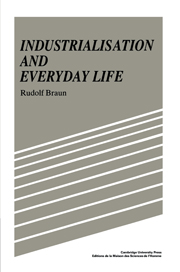Book contents
- Frontmatter
- Contents
- Prefaces
- Acknowledgements
- Note on measures and coinage
- Introduction
- 1 The preconditions for industrialisation
- 2 Changes to the structure of family and population in the industrial regions
- 3 Life and society of the population engaged in industry
- 4 The impact of industrialisation on the house and the rural economy
- 5 Work in the putting-out industry and its effect on the life of the common people
- 6 The outworkers' attitude to poverty and crises
- 7 Conclusion
- Postscript
- Appendix: a note on the administrative structure and social stratification in the countryside of Zurich during the Ancien Régime
- Notes
- Sources and bibliography
- Index
6 - The outworkers' attitude to poverty and crises
Published online by Cambridge University Press: 16 March 2010
- Frontmatter
- Contents
- Prefaces
- Acknowledgements
- Note on measures and coinage
- Introduction
- 1 The preconditions for industrialisation
- 2 Changes to the structure of family and population in the industrial regions
- 3 Life and society of the population engaged in industry
- 4 The impact of industrialisation on the house and the rural economy
- 5 Work in the putting-out industry and its effect on the life of the common people
- 6 The outworkers' attitude to poverty and crises
- 7 Conclusion
- Postscript
- Appendix: a note on the administrative structure and social stratification in the countryside of Zurich during the Ancien Régime
- Notes
- Sources and bibliography
- Index
Summary
In this chapter we will attempt to darken the picture we have drawn of the outworkers' living conditions. The method employed up to now has obliged us to deduce the changes to their forms of life from how the life of the common people appeared during times of prosperity. This was dictated by our line of enquiry and method of research, since the times of prosperity provided the outworkers with not just the material, but also the spiritual preconditions, the zest for life, which enabled them to set themselves apart from their former, mainly peasant, environment in an independent life style. At the same time, periods of higher prices, of crisis, work stoppages and terrible poverty were no less effective in forming the outworkers' conditions of existence. When we attempt in the following pages to fill in our picture with these gloomy tones, we will get little help from an ‘objective’ observation of the prevailing conditions. For instance, we neither can nor want to calculate the ‘standard of living’ by relating wage rates to the ‘cost of living index’. This does not appear to be a useful exercise in a folklorist enquiry, because such methods pay too little attention to chronological and mental historical aspects. We must try to understand the economic and social conditions of the industrialised population from the spirit of the age and we may not judge them with our modern socio-political values. This may seem an obvious proviso. It is, however, difficult to put into effect, because we are scarcely aware of how accustomed we are to thinking in different categories, precisely in the social and socio-political sphere.
- Type
- Chapter
- Information
- Industrialisation and Everyday Life , pp. 154 - 183Publisher: Cambridge University PressPrint publication year: 1990



